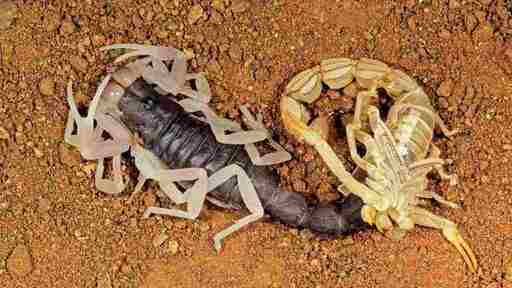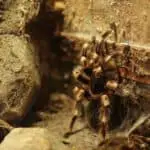Pet owners always get worried when their pet is not eating, especially if it is a non-conventional pet that we are not familiar with, such as the scorpion. There are a few reasons why your scorpion refuses to eat. I’ve listed them below, together with things that you need to do.
Your Scorpion is not Hungry
That’s a pretty straightforward answer, isn’t it? Your scorpion doesn’t eat if it is not hungry.
Scorpions are voracious eaters. When given a chance, they can eat a lot, up till its opisthosoma is at the verge of exploding. They do this to ensure survival in the wild, because they don’t know when they will be able to find their next meal.
However, that doesn’t mean they need a lot of food. Scorpions have a very slow metabolic rate. As a result, they don’t need to eat a lot.
Juvenile scorpions require more food because they are growing. Meanwhile, adult scorpions don’t require a lot of food. Feeding them 3-4 crickets once a week is usually more than enough.
The Size of the Prey is too Big or too Small
The scorpions seize their food by using their strong and large pincers. They either kill the prey or eat them alive. They may use the venom in their stinger if the prey is too powerful for them to handle.
Generally, scorpions feed on prey that is about ⅓ -½ its body size. They rarely attack prey bigger than that. Scorpions also do not attack prey which are too small for them to grab with their pincers.
On certain occasions, scorpions may attack bigger prey. This is an exception than a norm. Prey that are big and strong can fight back, and may injure your scorpion.
The Scorpion is Molting

Like other arthropods, scorpions grow by molting (understand more on molting), a process where they shed their old exoskeleton, and grow new a one.
When preparing for molt (also known as the premolt stage), scorpions typically stop eating. The premolt period can last for a few days to weeks.
Molting is an important and rigorous process. When the scorpion is molting, it may hide inside its burrow, or in a secluded place, and stop moving. Do not touch or disturb your scorpion in any cases.
After molting, the exoskeleton of the scorpion will remain soft. Wait for at least a week before reintroducing food so that the exoskeleton is hardened by then. If the scorpion still refuses to eat, try again after a week. Larger scorpions tend to have a longer post-molt period.
Make sure that water is always present in the water dish before and after molting, because enough water will help facilitate molting.
It is important to remove all feeder insects in the enclosure when your scorpion is molting because the scorpion is extremely vulnerable at this stage. As the owner, you should also stop disturbing your scorpion and ensure it is in a safe environment.
So, how do you know whether your scorpion is going to molt?
A scorpion is going to molt if it becomes extremely engorged and inactive, but more aggressive than usual. When prey is offered, the premolt scorpion may kill it, but doesn’t feed on it. You can also see a layer of new exoskeleton from the side view of their opisthosoma, through the pleural membrane.
The Prey is Hard to Hunt
While scorpions may eat anything offered, they may have issues hunting certain prey. For instance, flies may land on the vertical walls or underneath the lid of the enclosure. Many scorpions don’t climb well, especially on smooth surfaces. Hence, they are unable to reach the prey.
Your Scorpion is Picky
When your scorpion is not extremely hungry, they can become picky. For instance, they may ignore prey that have thick exoskeletons (such as beetles or woodlice), and those that emit foul gasses or liquids (such as stink bugs and certain species of millipedes).
It is too Cold
Scorpions are cold-blooded creatures. Their metabolism rate is affected by temperature. When the temperature is cold, the scorpions become inactive, spend less energy, and stop feeding. There are exceptions though. Several rare scorpion species in Brazil and North America are known be to active in the colder months, and inactive in the warmer months.
Scorpions are known to overwinter without feeding. You don’t have to worry about them starving.
If you are keeping tropical species such as Asian forest scorpions, you will need to provide them extra heat in the winter.
Put a heat mat at a corner of the enclosure to create a heat gradient. The scorpion will move to wherever it feels comfortable. Don’t put the heat mat at the center to avoid frying the scorpion.
It is Fasting
Scorpions are known to fast. In nature, the scorpion eats as much as possible due to the uncertainty in food supplies. After the feast, the scorpion fasts for many weeks or months, until it finds food.
In captivity, owners usually feed their scorpions with equal amounts of food at a consistent interval. However, the scorpions may still exhibit fasting behaviors from time to time, due to unknown reasons.
Fasting usually lasts for a few weeks. On rare occasions, it may last for months.
If the scorpion ignores the food, simply remove it and try again after a week.
Make sure you keep the water dish filled. Your scorpion needs to be hydrated to survive fasting.
It has not Acclimate
If you have just gotten your scorpion from a seller, let it acclimate to the new enclosure for a few days. The scorpion is likely stressed out during the transportation, and needs some time to calm down and get used to the new environment.
The scorpion would have stayed inside a hot logistic vehicle for days, if not weeks. By the time you receive it, it could be severely dehydrated. Make sure you give it water.
Feed your scorpion after 1 week. It should start eating by then.


